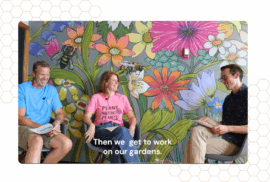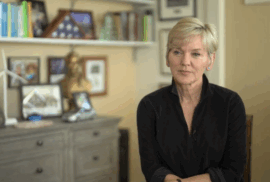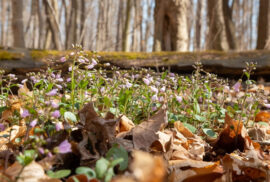A legacy of impact: John Erb, 26th Milliken Award recipient

Authored by

Grace Noyola
If you asked John to describe the roots of the Erb Foundation, he would tell you it’s “bittersweet.” When his father was diagnosed with Alzheimer’s disease, his family had to decipher a clear directive outlined in his estate planning—use his legacy to create a family foundation. Unfortunately, that directive did not come with a blueprint on how to make impact.
As John investigated where his parents had given historically one thing was clear: they were concerned for the future of the planet and what we are leaving future generations. In 2007 the Fred A. and Barbara M. Erb Family Foundation began with John as president. What began as a portfolio of just three grants in 2008 has grown to a large network of support that empowers changemakers across the state to drive environmental progress forward.
To date, the Erb Family Foundation has made more than $165 million in grants that advance an environmentally healthy and culturally vibrant metro Detroit and a flourishing Great Lakes ecosystem.
Driving leading environmental research & shaping young environmental leaders
John believes that the great leaders of tomorrow will approach problems and solutions holistically, asking not only what problems need fixing, but what problems might we create if we don’t consider our impact? The Erb Foundation has established and supported the University of Michigan’s Water Center. Before the Foundation was created, the Erb family also supported the creation of the Frederick A. and Barbara M. Erb Institute. Both support research, faculty and students to tackle modern business issues through a lens of sustainability.
The Water Center is a bridging organization that connects experts on campus with external stakeholders like state and local governments, tribal communities and nonprofit organizations. The Center convenes representatives from both sectors to tackle real problems that the stakeholders are facing, using students, faculty and research to develop leading solutions. Early on, many questioned whether a higher education institution could move quickly enough and be flexible enough to address on-the-ground issues, but the Center has proved that these types of collaboration are incredibly beneficial to both the university and outside entities.
Through a multi-year project, the Water Center led a collaborative group to model where nutrients were entering the Detroit River Watershed in an attempt to address the negative impacts of nutrient loading in Lake Erie. This watershed is diverse, including areas of the United States and Canada, and encompassing rural, agricultural, suburban and urban communities. The final result was a multi-faceted set of recommendations tailored to the different representatives on the advisory panel. Jen Read, Director for the Water Center, noted that these types of projects not only provide real benefits to the communities and organizations that partner with the university, but also give faculty and students the opportunity to contribute to real-time solutions that are making a difference.
Reducing plastic waste & inspiring corporate leadership
In 2009 John was one of the founding board members of the Detroit Zoo’s “Greenprint” initiative, which was developed to incorporate environmental sustainability into all aspects of the zoo. He was pivotal in its transition away from plastic water bottles—a huge source of revenue at 60,000 bottles sold annually that generated $250,000. The Erb Foundation has continued to support various projects through the Zoo’s Greenprint, including a Nature Center and an on-site anaerobic digester.
At our 26th Milliken Celebration, John shared a story of attending an environmental conference in Ontario, Canada many years ago. A demonstration table had been set up with a plastic water bottle, filled halfway with oil. It represented the amount of oil needed to create that single bottle of water. It was in this moment that John realized the sheer environmental impact the Detroit Zoo could make if it eliminated the sale of bottled water. Soon after, he brought that proposal to his fellow board of directors.
Putting resources in the hands of changemakers
If you asked John what he’s most proud of reflecting on the Erb Foundation’s legacy, he would tell you hands down that it’s the people—those who are working on-the-ground in communities across Michigan, tackling pressing issues that advance the goals of the Foundation.
One such group is The Greening of Detroit, a nonprofit organization working to reforest Detroit one neighbor-hood at a time. It also provides youth and adult workforce development programs that connect Detroiters from every walk of life with careers in forestry, urban architecture and more. The Erb Foundation has supporting The Greening of Detroit for over 15 years, including providing critical flexible funding to the organization during the COVID-19 pandemic.
Since its inception The Greening of Detroit has planted 150,000 trees across Detroit, going neighborhood by neighborhood and inviting local residents to get involved along the way. Lionel Bradford is the President and Executive Director for The Greening of Detroit and would describe himself as a “tree guy.” Why? Because the benefits are not just environmental.
Detroit is home to some of the worst air quality and child asthma rates in the nation. Trees provide a critical service in filtering toxins out of the air. Upon maturity they also provide shade that helps lower the temperatures in neighborhoods, something of increased importance considering the fact that many Detroiters don’t have central air conditioning and are facing rising summer temperatures as a result of the climate crisis.
—
John Erb exemplifies the qualities of outstanding leadership, enduring commitment and extraordinary public service that define the Helen & William Milliken Distinguished Service Award. He was honored at the 26th Milliken Award Celebration on Thursday, August 30. You can view event photos by clicking the button below.
Discover
Power environmental change today.
Your gift to the Michigan Environmental Council is a powerful investment in the air we breathe, our water and the places we love.
Sign up for environmental news & stories.
"*" indicates required fields




